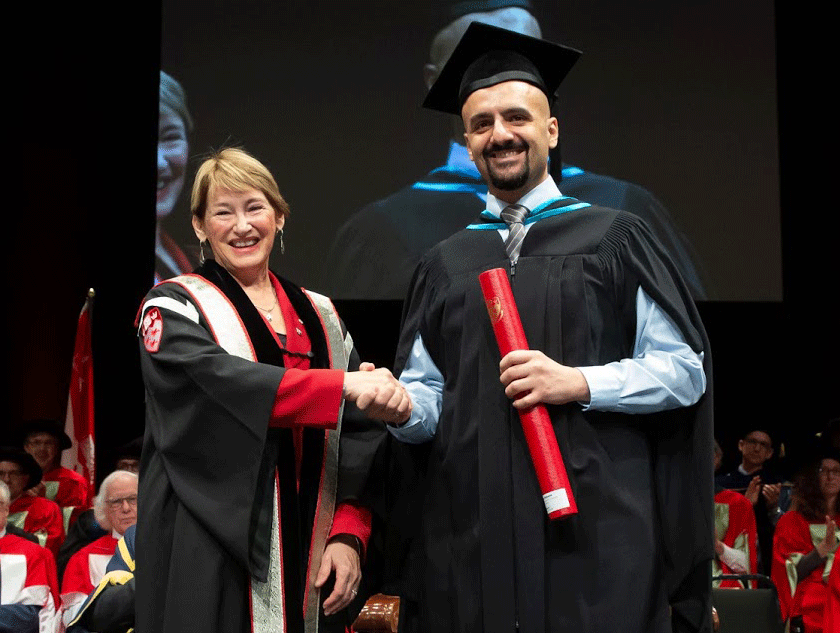
Five of McGill’s exceptional educators were awarded a Principal’s Prize for Excellence in Teaching at yesterday’s Fall Convocation ceremonies. Established in 2000, The Principal’s Prize is presented to one recipient in each of five categories: Course Lecturer, Faculty Lecturer, Assistant Professor, Associate Professor and Full Professor. The McGill Reporter spoke to this year’s recipients and asked them about their early teaching gigs, their mentors and what conditions they must create in the classroom to get the most from their students. Note: Allison Christians, Faculty of Law, and winner of the Principal’s Prize for Excellence in Teaching in the Full Professor category, was unavailable for comment.
Marwan Kanaan (Faculty of Engineering), Course Lecturer category
One of Marwan Kanaan’s greatest qualities as a teacher is that he remembers what it was like to be a student.
“I’ve always had empathy for my students. Even when I was in high school, when I was bored in class, I said to myself ‘If I ever become a teacher, I will never forget my days as a student,’” he says.
Kanaan, who teaches in both the Electrical and Computer Engineering Department and the Mechanical Engineering Department, understands that not everyone who enters his class will be as engaged with the subject matter as he is. “I’ve always known that the average student is not as invested in engineering as I am. I teach it because I’m interested in it and I’m an expert on it. It’s important to keep that gap in mind,” he says.
Bridging that ‘gap’ lies at the very essence of what good teachers do, says Kanaan. It means taking note of course material that doesn’t lend itself to easy simplification, even for someone with his expertise. “If I get stuck on trying to come up with a good way to explain something, that indicates to me that the students will probably find it even harder,” he says. “So, I elaborate on it in the lecture even more, knowing that it will be difficult material for my students.”
It is a process that Kanaan relishes because, on top of making him a better teacher, it pushes him to look at topics in a new light. “There’s a lot of elegance in explaining a complex topic in simple terms,” he says. “You come to know your subject matter more than you ever imagined you would know something. You become an expert, because you are constantly being asked questions by bright minds, so you’d better know your stuff.”
Himself a product of McGill, Kanaan felt the pull of the classroom as a graduate student soon after he became head TA for the Electrical Measurements Lab. He says the spirit of teamwork and collegiality is strong within the student body. “The thing I like the most about McGill students is the strong sense of camaraderie,” he says. “I haven’t felt it as much at any another university. Everyone is so collaborative. The feeling you get around them is that they are all in it together.”
When asked what advice he would give people about to embark upon a teaching career, Kanaan harkens back to those days when he was sitting at a desk taking notes, not standing in front of a class delivering a lecture. “Draw on your own personal experience and remember how it was when you were a student,” he says. “Were you ever bored in class? Remember why. Did you ever feel lost in a class? Remember why. Having empathy for the student’s experience is crucial.”
Sidney Trudeau (Faculty of Science), Faculty Lecturer category
Sidney Trudeau is a reporter’s best friend. If he were a pro hockey player, he would definitely not be the guy spewing clichés like “giving 100 per cent.”
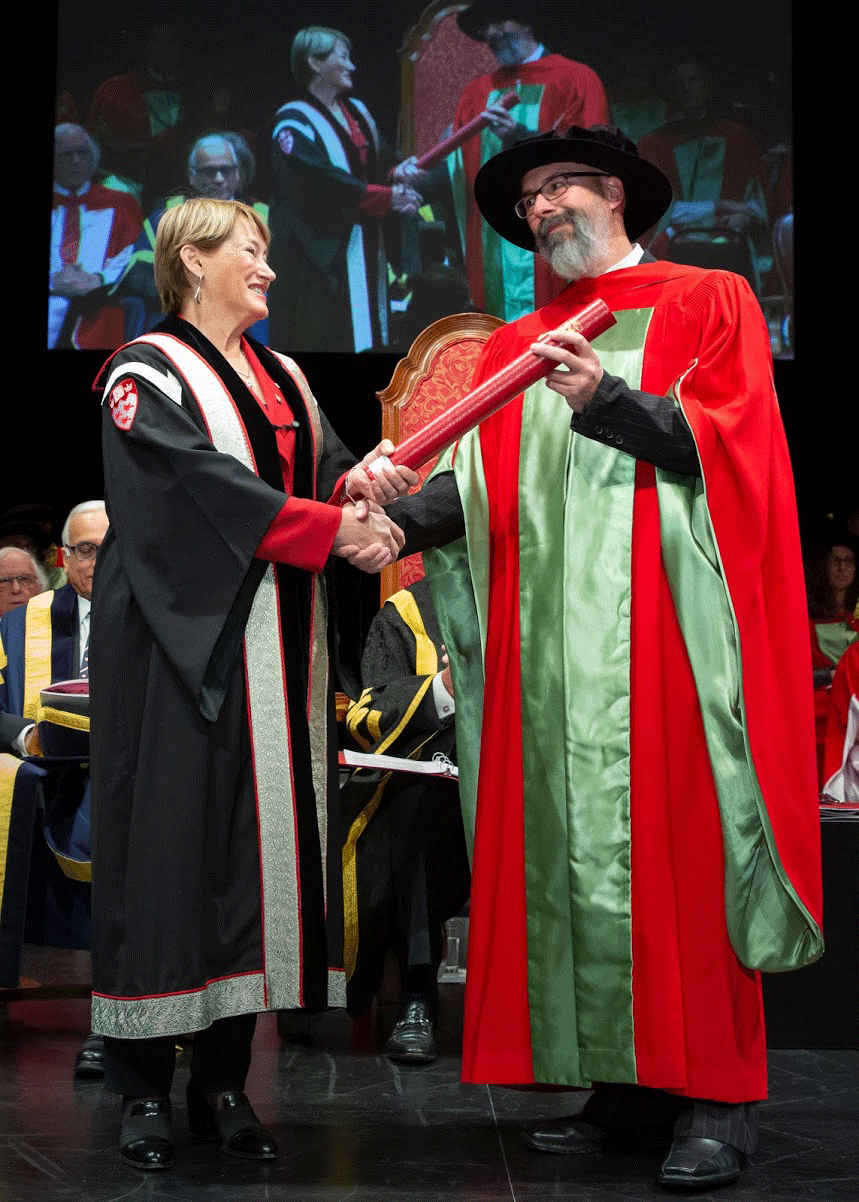
A case in point; when asked how long he’s been at McGill, Trudeau, the Calculus Coordinator in the Mathematics Department, answered “I started here as an undergraduate student in 1991 and never left. Where was I going to go? There’s nowhere to go but down!”
There is a lovely irony in Trudeau being named winner of a Principal’s Prize for Excellence in Teaching. “Here’s the thing: I didn’t know I wanted to teach until I actually started to TA when I was doing my Master’s,” he says. “That’s why, when students come to see me saying they don’t know what they want to do, I tell them that there’s no rush. Try this, do that, relax: don’t put too much pressure on yourself. It’s not like you have to immediately commit to something and decide right away. You can even change your mind along the way.”
Even then, it wasn’t love at first class. Trudeau had to overcome his own inhibitions. “I’m not very outgoing and relatively shy. I hadn’t given teaching any thought, even when I got assigned to TA that first class,” says Trudeau. “But it hit me when I got to the actual classroom in the Arts Building. I remember thinking, just outside the class, ‘what am I doing here?’ But I forced myself to go in and never looked back.”
For Trudeau, connecting with his students is an essential component for success. But making that vital connection isn’t always easy. “The classes are getting larger, and it is more difficult to be close to the students. It is easy for students who are in difficulty to remain anonymous, not seek the help they require and ultimately do poorly in a course,” he says when asked about the biggest challenges he faces in the classroom.
And while Trudeau is genuinely honoured to be awarded a Principal’s Prize, he says that his greatest reward as a teacher is coming to work every day. “The students and professors here are the smartest people I have ever met,” he says. “Being surrounded by brilliance certainly motivates me to be better.”
Nicole Li-Jessen (Faculty of Medicine), Assistant Professor category
“To be honest, I never see myself as a teacher, per se. These days, information is so accessible that learners can teach themselves through many technologies online. I see myself more as sharing my knowledge and experience with my ‘colleagues-in-future,’” says Nicole Li-Jessen, winner of the Principal’s Prize for Excellence in Teaching in the Assistant Professor category. “I am the one in front of the classroom simply because I have been in the field longer and have some insights and experience that I can share with other learners who are relatively new in the field.
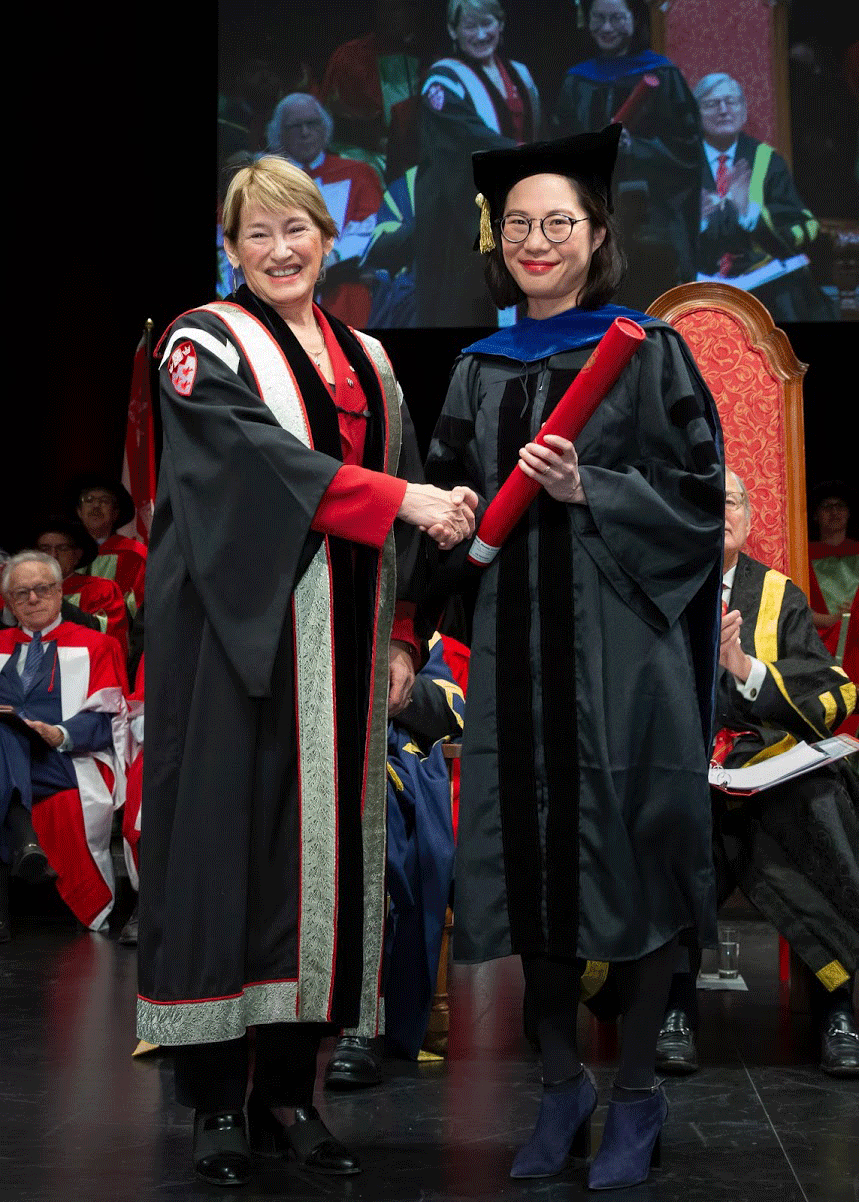
“In fact, I see myself as a learner in the classroom as well,” she continues. “My students have given more to me than I give to them.”
An Assistant Professor in the School of Communication Sciences and Disorders, and the Canada Research Chair in Personalized Medicine of Voice Disorders, Li-Jessen has been teaching – and learning – at McGill since 2014.
Li-Jessen conducts basic and translational research in personalized medicine of voice disorders. She understands that sometimes a frustrating communication barrier exists between clinicians and scientists. She tries to address this issue in the classroom by pushing her students “not only to grow as knowledge-acquirers and knowledge-users, but also to mature into knowledge-creators through active engagement in scientific research.
“I’ve always enjoyed the feeling of ‘educational growth’ myself,” she says, crediting her mentors during her graduate, doctoral and post-doc training. “They inspired me greatly and I thought it’d be nice if I could do something similar in my career.”
Li-Jessen believes that the best teaching strategy is to plan carefully, but to have enough built-in flexibility to address the individual needs of each student.
“Early in my career, the challenge was how to create a purposeful and rewarding learning experience for students while still giving them room to self-reflect and thrive at their own pace within a very busy clinical program,” she says, thanking Teaching and Learning Services for their continued support. “To approach this learner-centered education, I formulated a close-knit program of problem-based learning, evidence-based medicine, hands-on practice, community outreach and research exposure.”
And because she sees herself as much a ‘learner’ as a ‘teacher,’ Li-Jessen relies heavily on input from her students to adjust her approach in the classroom.
“I always receive constructive feedback on how to make the courses better,” she says. “I think my students see that I sincerely care, so the bond between us develops naturally and organically. The teaching experience has been very rewarding at McGill.”
David Ragsdale (Faculty of Medicine) Associate Professor category
At yesterday’s morning Convocation ceremony, David Ragsdale was in an unfamiliar spot. For the past 10 years, the Associate Professor in the Department of Neurology and Neurosurgery has read the names of graduating students as they walk across the platform to accept their diploma. This time around, it was his name being read aloud as he stepped forward to receive his Principal’s Prize for Excellence in Teaching.
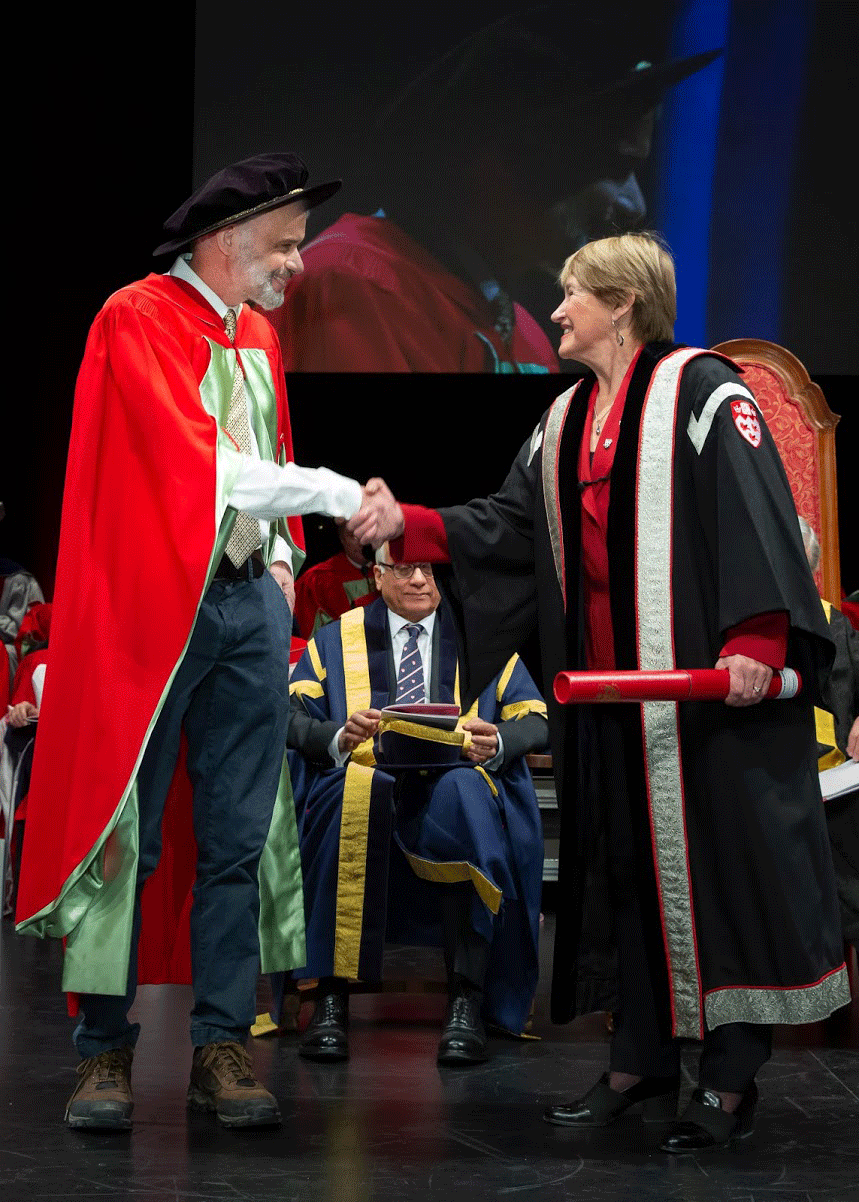
Ironically, when Ragsdale arrived at McGill in 1996, teaching was not top of mind. Having completed his graduate studies in neuroscience at University of California Irvine and completed his postdoc at the University of Washington, Seattle, Ragsdale was recruited to do basic research in neuroscience at the Montreal Neurological Institute. “But from the beginning I felt more at home in the classroom than in the research lab,” he says. “I feel much more comfortable with the students than I do with my peers, so I think the relationship I have with them comes naturally to me.”
Today, Ragsdale fosters those relationships in 14 different courses, exploring the complexities of the human brain with undergraduate students, graduate students and medical students. “I like trying to make difficult concepts understandable,” he says.
As one might expect, Ragsdale lists interacting with students – in and out of the classroom – as the very best aspect of his job. “My favorite thing about being a teacher is when a student runs into me in some random context (e.g. walking down the street or sitting at Starbucks) and tells me they really enjoyed one of my courses and/or that it had a significant impact on them,” he says. “I also like it when students ask questions, especially when they’re not just about the content of the day’s class but about bigger ideas that the content of the course have gotten them thinking about.
“In fact, that would be one piece of advice I’d give to students,” he continues. “Ask questions, before class, during class and/or after class. You’re not bothering the instructor. You’re showing them that you are interested, which will make them more engaged as teachers.”
Ragsdale admits that he’s somewhat concerned about how the university of tomorrow will continue to foster this vital student-teacher interaction in the face of the virtual classroom. “As technologies continue to improve, the old teaching methods (e.g. large lectures) become more and more obsolete,” he says. “I think the University needs to remain a physical place with classrooms, etc., rather than a virtual learning environment. But finding ways of keeping actual classes (i.e. students and teachers meeting in a classroom) relevant is going to be a challenge for all of us.”
Allison Christians (Faculty of Law), Full Professor Category
Allison Christians was named winner of the Principal’s Prize in the Full Professor category. Christians is Associate Dean (Research) and the H. Heward Stikeman Chair in the Law of Taxation. Her research and teaching focus on national and international tax law and policy issues, with an emphasis on the relationship between taxation and economic development, and on the role of government and non-government institutions and actors in the creation of tax policy norms.
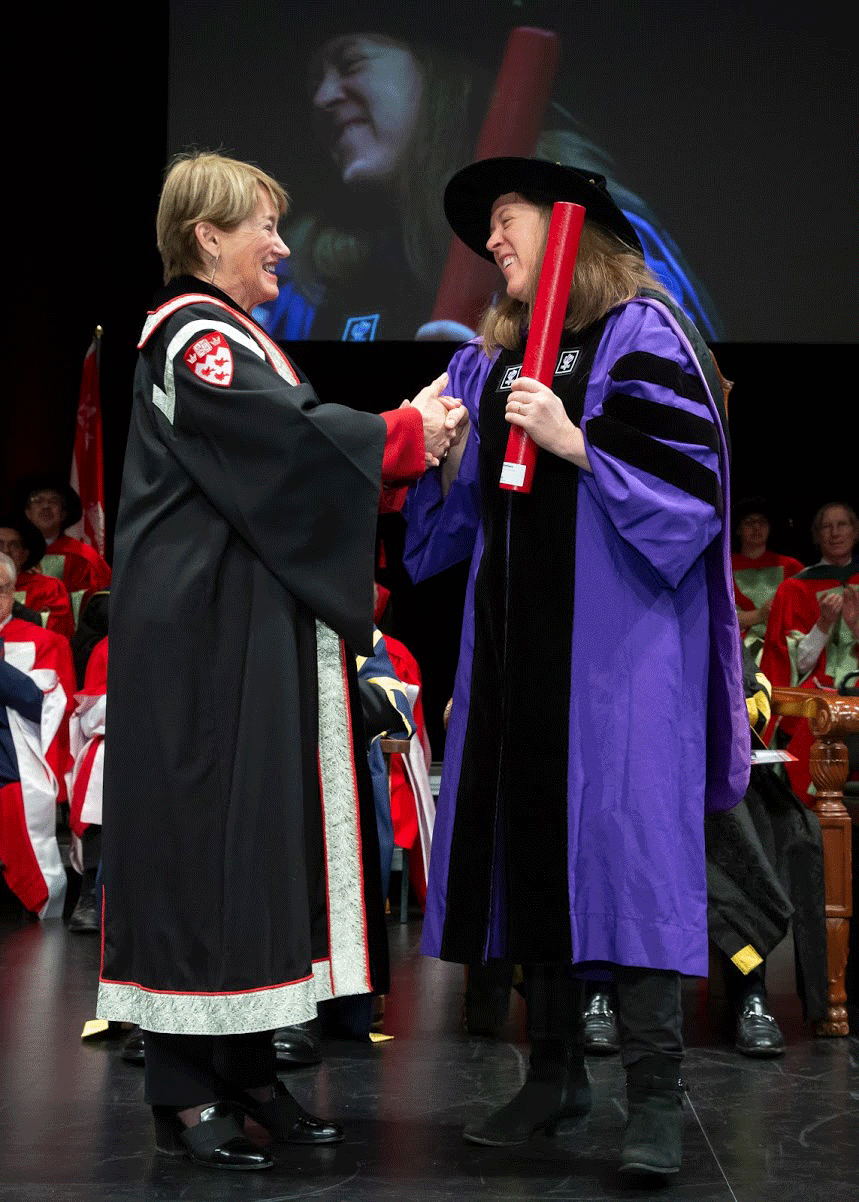
In his introduction, Provost Manfredi told the audience that Christians has long been a favourite of students, both for her innovative teaching methods and her approachable demeanour.
“Her students, past and present, agree that she embodies the very best that the University has to offer,” he said. “They praise her visionary approach to teaching and her innovative and participatory teaching methods. They all agree that her open-door policy is without equal and it extends from her office to the classroom where students and colleagues alike are welcome to join in discussions.”
“Professor Christians excels in integrating research and teaching and offers students the opportunity to give direct feedback with actual cases from law firms,” continued the Provost. “Her approach to teaching is original, energetic and highly entertaining, and she has established an award-winning, online profile that has become a model for collaboration and dissemination of knowledge.”
Provost Manfredi told the audience that in 2014, the Law Student Association of McGill University selected Christians as the recipient of the John Durnford Prize in Teaching Excellence further evidence of the high regard in which Christians is held. Said the Provost in closing; “It is only fitting then that the last words come from one of her grateful and admiring students, and I quote ‘Professor Christians is simply awesome.’”
